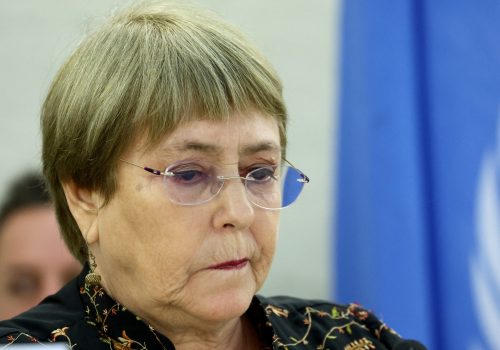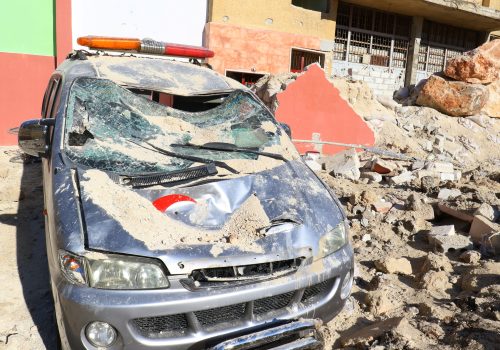One Iranian perpetrator gets a life sentence. Another is potentially set free.
به زبان فارسی بخوانید
یک مجرم ایرانی به حبس ابد محکوم میشود. دیگری احتمالاً آزاد میگردد.
نوشته سلست کمیوتک
ماه ژوئیه برای وکلای حقوق بشر و فعالان، به ویژه کسانی که در مورد ایران فعالیت میکنند، تلخ و شیرین بود. در تاریخ ۱۴ ژوئیه، دادگاه منطقه استکهلم اعلام کرد که حمید نوری، مقام سابق ایرانی، به جرم جنایات جنگی و قتلعام محکوم شده و مجازات حبس ابد دریافت کرده است.
تنها چند روز بعد، در ۲۱ ژوئیه، پارلمان بلژیک پیمان همکاری قضایی دوجانبهای را تصویب کرد که به موجب آن، مجرمان ایرانی که در بلژیک زندانی هستند، میتوانند محکومیت خود را در ایران بگذرانند و بالعکس. این پیمان به طور گستردهای به عنوان یک مبادله قانونی زندانیان برای مبادله اتباع اروپایی که در ایران گروگان گرفته شدهاند، مانند اولیویه واندکاستیل، امدادگر بلژیکی، با اسدالله اسدی، دیپلمات سابق ایرانی که به دلیل تلاش برای بمبگذاری در تجمع مخالفان ایرانی در بلژیک محکوم شده و در زندان بلژیک دوره محکومیت خود را میگذراند، تلقی میشود. در حالی که این محکومیت در سطح جهان مورد تحسین قرار گرفته است، پیمان مزبور به طور بینالمللی محکوم شده است.
حکم نوری یک پیروزی برای عدالت بود، که نخستین محکومیت در دادگاه برای یکی از عاملان قتلعامهای زندانیان در سال ۱۹۸۸ را به ثبت رساند، قتلعامی که در طی آن هزاران زندانی سیاسی اعدام شدند. نوری در زمان این قتلعامها دادیار بود و ثابت شد که او آگاهانه و تعمداً زندانیان را بدون محاکمۀ عادلانه برای اعدام میفرستاده است. این حکم از نظر قانونی بسیار مهم است و باعث تقویت بیشتر علم حقوق در مورد جرایم مرتبط، حقایق مربوط به قتلعام و امور مرتبط با رویۀ قضایی میشود. از لحاظ احساسی، این حکم به خانوادههای قربانیان اجازه داد تا بالاخره شاهد پاسخگویی یک فرد برای جنایاتش باشند. علاوه بر این، از دیدگاه سیاست، این حکم نشان داد که کشورهای متعهد به عدالت میتوانند در هر کجا که لازم باشد، عدالت را اجرا کنند و به جنایتکاران در خارج از کشور پناهگاهی امن ندهند.
با این حال، پیمان بلژیک سایهای تاریک بر این خبر افکنده است. این پیمان یک مزیت فوری و آشکار دارد که نمیتوان و نباید نادیده گرفت: و آن هم این است که این امکان را فراهم میکند که واندکاستیل به خانه بازگردد. مبادلات زندانیان—رسمی و غیررسمی—در موارد گروگانگیری دولتی، امری غیرمعمول نیست و برای بازگرداندن گروگانهای در ایران نگهداشته شده، مانند جیسون رضائیان روزنامهنگار ایرانی-آمریکایی و کایلی مور-گیلبرت پژوهشگر استرالیایی-بریتانیایی، استفاده شده است. با وجود این، در حالی که واندکاستیل و همه گروگانهای دیگر سزاوار آزادی فوری هستند، آنها مستحق عدالت نیز هستند. پیمان بلژیک برخلاف مبادلات موقت، دائمی است و نسبت به تلاشهای جهانی برای پاسخگویی، آسیبهای گسترده و بلندمدتی وارد خواهد ساخت.
اولاً، این پیمان یک همارزی کاذب بین سیستمهای قضایی بلژیک و ایران ایجاد میکند. توافقی بین دو کشور که به افراد محکومشده به طور قانونی اجازه دهد تا محکومیتشان را درکشور خود سپری کنند، به طریقی که این محکومیت عادلانه و انسانی باشد، قابل ستایش است. اما این دو کشور افراد را به طور قانونی محکوم نکردهاند—فقط یکی از آنها این کار را کرده است. بلژیک زندانیان بازگرداندهشده را به دلیل بیگناهیشان تبرئه خواهد کرد. ایران این کار را به دلیل فساد انجام خواهد داد. تعداد بیشماری از قربانیان و بستگان آنها جزئیات محاکمههای نمایشی توسط قوه قضاییه ایران را شرح دادهاند. در واقع، اعضای قوه قضاییه ایران، از جمله قضات، ناقضان حقوق بشر محسوب میشوند.
گروه کاری بازداشتهای خودسرانه—یک نهاد زیرمجموعۀ سازمان ملل و یکی از معدود مکانیسمهایی که در مورد رویه گروگانگیری دولتی ایران صلاحیت قضایی دارد— اعلام کرده است که در بیش از سی و هفت مورد، بازداشتِ انجام شده در ایران، خودسرانه و حداقل تا حدی به دلیل نقض محاکمه عادلانه بوده است. بنابراین معاهدۀ مزبور حتی با پیشنهاد همارزی بین این دو سیستم، این یافتهها را تضعیف میکند، اهرم فشار در مذاکرات آزادی سازی را کاهش میدهد و در عین حال تلاشهای مسئولیتپذیری که ممکن است بتواند برای گروگانها، دادخواهی فراهم کند را مختل میسازد.
دوم، این معاهده عملاً بلژیک و هر کشور دیگری که از این رویکرد پیروی کند را به پناهگاهی امن برای عاملان جنایات جدی بینالمللی تبدیل میکند. اگرچه عاملان همچنان میتوانند در بلژیک تحت صلاحیت قضایی جهانی محاکمه شوند—که به کشورها اجازه میدهد عاملان را بدون توجه به ملیت یا محل وقوع جرم محاکمه کنند، که دادگاه سوئدی نیز بر همین اساس توانست نوری را محاکمه کند—این پیمان نتیجه چنین محاکمهای را به ثبت حقایق، ایجاد سابقه قانونی و اخراج محدود میکند. این امر، نتیجه را فقط کمی مؤثرتر از تحریمهای سبک ماگنیتسکی میسازد که داراییهای عاملان را مسدود کرده و از دریافت ویزا ممانعت به عمل میآورد، در حالی که شاهدان و مجریان قانون را دچار خطر و تلاش بسیار بیشتری میکند.
با توجه به تحلیل سود و زیان این کار، بعید است که قربانیان و شاهدان بخواهند یک پرونده را پیگیری کنند و حتی احتمال کمتری وجود دارد که مقامات بلژیکی اگر درخواستی مطرح شود، انگیزهای برای پیگیری آن داشته باشند. عاملان ایرانی (به جز کسانی که تحت تحریمهای سبک ماگنیتسکی در اتحادیه اروپا هستند) اکنون عملاً آزادی کامل دارند تا به بلژیک سفر کرده یا حتی در آنجا مستقر شوند، از پاسخگویی فرار کنند و در عین حال قربانیانی که قبلاً به آنجا گریختهاند را به خطر بیندازند.
چنین پناهگاه امنی مصونیت از مجازات، که عاملان در ایران از آن برخوردار هستند را تثبیت و گسترش میدهد. هنگامی که گفتگوی عدالت به میان میآید، ایران یک پوشش محافظ قوی دارد که نفوذ به آن دشوار است، زیرا حبابی ایجاد کرده که در آن عاملان تا زمانی که در کشور باقی بمانند، میتوانند تقریباً هیچ پیامدی نداشته باشند، هیچ گزینه پاسخگویی داخلی قابل اعتمادی وجود ندارد، ایران عضو دادگاه جنایی بینالمللی نیست و هیچ دادگاه حقوق بشری منطقهای هم وجود ندارد که بتواند بخشی از آن باشد.
صلاحیت قضایی جهانی یکی از معدود راههای موجود برای قربانیان ایرانی است تا به دنبال بازخواست باشند. با این حال، این صلاحیت به دلیل تعداد محدود کشورهایی که چنین مقرراتی دارند، و همچنین به دلیل موانعی مانند نیاز به حضور عامل قبل از تحقیق یا اجازه دادن به پیگرد قانونی تنها برای جنایاتی که پس از تاریخهای خاصی رخ دادهاند، محدود است. پیمان بلژیک این گزینه را حتی محدودتر میسازد، بهطور مؤثر بلژیک را از میز محاکمات خارج میکند و اگر سایر کشورهای اروپایی از این رویکرد پیروی کنند، ممکن است گزینههای واقعبینانه برای صلاحیت قضایی جهانی بهطور کامل حذف شود.
در نهایت، در حالی که افزایش یافتنِ مصونیت از مجازات، برای قربانیان جنایات گذشته ویرانگر است، این اطمینان را میدهد که مقامات ایرانی برای تشدید جنایات گسترده خود، به ویژه در سطح بینالمللی، جسورتر خواهند شد. اگرچه بلژیک از طریق این پیمان به صراحت چنین جنایاتی را تأیید نمیکند، اما بهطور ضمنی میپذیرد که این جنایات بدون پیامد ادامه خواهند یافت. این وضعیت، تمامی ایرانیان، به ویژه کسانی که در بلژیک هستند—از جمله هر شاهدی که علیه اسدی شهادت داده است و اکنون دیگر به جبران کافی خسارات دسترسی ندارد—را در معرض خطر قرار میدهد.
اعضای خانوادههای قربانیان قتلعام ۱۹۸۸ نزدیک به سی و چهار سال در انتظار هر گونه پاسخگویی ماندند. آنها و همه قربانیان نقض حقوق بشر در ایران سزاوارند که زمانی را برای جشن گرفتن اجرای عدالت، به یاد آوردن عزیزان خود و امید به حمایت بینالمللی بیشتر اختصاص دهند. در عوض، شبح شوم بی کیفری مداوم بر احساس عدالتخواهی آنها سایه افکنده است. بلژیک باید این مسیر منفی را مورد بازبینی قرار دهد. و تمامی کشورهای دیگر که دارای حاکمیتِ قویِ قانون هستند باید فوراً متحد شوند تا با تقویت، نه تضعیفِ گزینههای پاسخگویی، از خانوادههای قربانیان ۱۹۸۸ و همه کسانی که از جنایات ایران تأثیر پذیرفتهاند، حمایت نمایند.
سلست کمیوتک یکی از وکلای پروژه اقدامات قضایی استراتژیک در شورای آتلانتیک است.
July was bittersweet for human rights lawyers and activists, particularly those working on Iran. On July 14, the Stockholm District Court announced that former Iranian official Hamid Nouri was found guilty of war crimes and mass murder and was sentenced to life in prison.
Just days later, on July 21, the Belgian parliament ratified a mutual legal assistance treaty that allows Iranian offenders imprisoned in Belgium to serve their sentence in Iran and vice versa. The treaty is widely assumed to serve as a codified prisoner swap to exchange European nationals held hostage in Iran, such as Belgian aid worker Olivier Vandecasteele, for former Iranian diplomat Assadollah Assadi, a convicted terrorist serving his sentence in a Belgian prison for an attempted bombing of an Iranian opposition rally. While the conviction has been internationally celebrated, the treaty has been internationally condemned.
Nouri’s verdict was a triumph of justice, marking the first ever conviction in a court of law for a perpetrator of the 1988 prison massacres, during which thousands of political prisoners were mass executed. Nouri was a deputy prosecutor during the massacres and was found to have knowingly and intentionally sent prisoners to death without fair trials. The verdict is monumental legally, further strengthening jurisprudence about the relevant crimes, the facts of the massacre, and procedural matters. On an emotional level, it allowed victims’ families to finally see at least one individual face consequences for their crimes. Additionally, from a policy perspective, it showed the power that countries committed to justice had to render it where needed and to deny perpetrators overseas safe havens.
The Belgian treaty, however, casts a dark shadow over the news. It allows one immediate and obvious benefit that cannot, and should not, be ignored: it allows Vandecasteele to return home. Prisoner swaps—official and unofficial—are not uncommon in state-sponsored hostage cases and have been used to return hostages held in Iran, including Iranian-American journalist Jason Rezaian and Australian-British academic Kylie Moore-Gilbert. However, while Vandecasteele and all other hostages deserve immediate release, they also deserve justice. Unlike ad hoc exchanges, the Belgian treaty is permanent, with sweeping and long-lasting damage to global accountability efforts.
First, the treaty creates a false equivalency between the Belgian and Iranian legal systems. An agreement between two states, which would allow legitimately convicted individuals to serve out their sentences at home, in a way that would make the sentence as fair and humane as possible, would be laudable. The two states have not, however, legitimately convicted the individuals—only one has. Belgium will exonerate returned detainees because of their innocence. Iran will do so because of corruption. Countless victims and their relatives have detailed the sham trials conducted by the Iranian judiciary. Indeed, members of the Iranian judiciary, including judges, are considered to be human rights offenders.
The Working Group on Arbitrary Detention (WGAD)—a subsidiary body of the United Nations and one of the few mechanisms with jurisdiction over Iran’s practice of state-sponsored hostage taking—has found on over thirty-seven occasions that an Iranian detention was arbitrary at least in part due to fair trial violations. By even suggesting parity between the two systems, the treaty undermines these findings, weakening leverage in negotiating releases while also impeding accountability efforts that could provide justice for hostages.
Second, the treaty effectively turns Belgium and any countries that follow suit into safe havens for perpetrators of serious international crimes. While perpetrators could still be tried in Belgium under universal jurisdiction—which allows countries to try perpetrators no matter their nationality or the location of the crime, and which was the basis by which a Swedish court was able to try Nouri—the treaty limits the outcome of such a trial to establishing the facts on the record, creating legal precedent, and deportation. This renders the outcome only slightly more effective than Magnitsky-style sanctions, which freeze perpetrators’ assets and ban them from obtaining visas, while requiring considerably greater risk and effort from witnesses and law enforcement.
It is unlikely that victims and witnesses will choose to pursue a case given the changed cost-benefit analysis, and it is even more unlikely that Belgian authorities will be motivated to take on a case if asked. Iranian perpetrators (except those who are subject to Magnitsky-style sanctions in the European Union) now have effectively free reign to vacation or even resettle in Belgium, evading accountability while also endangering victims who previously fled there.
Such a safe haven entrenches and widens the impunity already enjoyed by perpetrators within Iran. Iran has maintained a tough veil to pierce when it comes to justice, creating a bubble where perpetrators can face virtually no consequences as long as they remain in-country; there are no reliable domestic accountability options, Iran is not a party to the International Criminal Court, and there are no regional human rights courts it could be a part of.
Universal jurisdiction offers one of the only outlets available for Iranian victims to seek recourse. However, it is already constrained by the limited number of countries with such provisions, as well as hurdles, such as requiring the perpetrator to be present before investigating or by only allowing prosecutions of crimes occurring after certain dates. The Belgian treaty narrows this option even further by effectively taking Belgium off the table for trials and, if other European countries follow suit, this may eliminate realistic options for universal jurisdiction completely.
Finally, while this increased impunity is devastating for victims of past crimes, it guarantees that Iranian officials will be emboldened to escalate their already extensive crimes, especially transnationally. While Belgium is not explicitly endorsing such crimes through the treaty, it tacitly accepts that they will continue without consequence. This endangers all Iranians, but especially those in Belgium—including any witnesses who testified against Assadi—who no longer have access to sufficient remedies.
Family members of the victims of the 1988 massacre waited just shy of thirty-four years for any accountability. They, and all victims of Iranian human rights violations, deserve to take time to celebrate justice, remember their loved ones, and hope for continued international support. Instead, their sense of justice has been tinged by the specter of ongoing impunity. Belgium should reconsider this negative path. And all other nations with a strong rule of law must immediately unite to support the families of the 1988 victims and all others affected by Iranian atrocities by strengthening, not undermining, accountability options.
Celeste Kmiotek is a staff lawyer with the Strategic Litigation Project at the Rafik Hariri Center and Middle East Programs.

The Atlantic Council’s Strategic Litigation Project injects fresh thinking into how governments and practitioners can apply legal tools to advance human rights and democracy around the world.
Further reading
Sat, Jun 18, 2022
Why I expected more from the UN human-rights chief
New Atlanticist By Rayhan Asat
Michelle Bachelet was supposed to fight for imprisoned Uyghurs like my brother. But she failed.
Tue, Jun 21, 2022
This organization is helping Syria’s LGBTQI community. Here’s how.
MENASource By
Guardians of Equality Movement and other organizations and groups like it are a promising indicator for renewable development.
Tue, Jun 14, 2022
Attacks on hospitals from Syria to Ukraine: Improving prevention and accountability mechanisms
Issue Brief By Elise Baker, Gissou Nia
When Russia invaded Ukraine on February 24, 2022, it soon began implementing one of its frequent—and criminal—tactics that it had already been using in its military intervention in Syria: bombing healthcare and medical facilities.
Image: People demonstrate outside the Stockholm District Court as they wait for the verdict in the case of Hamid Noury, a former Iranian prosecution official accused of crimes against international law and murder in Iran 1988, in Stockholm, Sweden July 14, 2022. REUTERS/Simon Johnson


